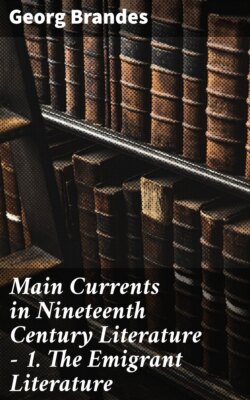Main Currents in Nineteenth Century Literature - 1. The Emigrant Literature

Реклама. ООО «ЛитРес», ИНН: 7719571260.
Оглавление
Георг Брандес. Main Currents in Nineteenth Century Literature - 1. The Emigrant Literature
Main Currents in Nineteenth Century Literature - 1. The Emigrant Literature
Table of Contents
IN SIX VOLUMES ILLUSTRATED. I. THE EMIGRANT LITERATURE
NEW YORK: THE MACMILLAN COMPANY. LONDON: WILLIAM HEINEMANN. MCMVI. To the Memory. of. HANS BRÖCHNER
INTRODUCTION
THE EMIGRANT LITERATURE
THE EMIGRANT LITERATURE
I
CHATEAUBRIAND
II
ROUSSEAU
III
WERTHER
IV
RENÉ
V
OBERMANN
VI
NODIER
VII
CONSTANT: "ON RELIGION"—"ADOLPHE"
VIII
MADAME DE STAËL: "DELPHINE"
IX
EXILE
X
"CORINNE"
XI
ATTACK UPON NATIONAL AND PROTESTANT PREJUDICES
XII
NEW CONCEPTION OF THE ANTIQUE
XIII
DE L'ALLEMAGNE
XIV
BARANTE
XV
CONCLUSION
MAIN CURRENTS IN. NINETEENTH CENTURY LITERATURE. By GEORGE BRANDES. In Six Vols, illustrated
Отрывок из книги
Georg Brandes
Published by Good Press, 2022
.....
How much passion had he not wasted upon fantastic imaginings and poetic dreams before he was reduced to this utter boredom! In Atala the passion still wells up like a hot spring, and its spray stings and scalds.
The old Indian, Chactas, tells the story of his youth to a young Frenchman to whom Chateaubriand has given his own second name, René. Chactas, taken captive by a hostile tribe, is condemned to death upon the pyre. The daughter of the chief of the tribe takes a fancy to him and approaches the place where he lies bound. He mistakes her for the maiden whose part it is to solace the prisoner in the last hour before the consummation of the death sentence; but her intention is to release, not to console. He conceives a sudden passion for her, and entreats her to fly with him and be his; she refuses, and, delayed by her opposition, he is recaptured. He is already adorned for the pyre, crowned with flowers, his face painted blue and red, and beads attached to his ears, when Atala delivers him for the second time and escapes with him. The greater part of the book describes this flight, Chactas's desire, and the mingling of passion and reserve in Atala which makes her constantly vacillate between resistance and surrender. Her behaviour is explained when she tells Chactas that her mother, who was seduced by a white man, had her baptized and made her swear to remain unwed. In her anguish at the vow and her despair of being able to keep it, she takes poison, and dies in her lover's arms, comforted by the old missionary in whose hut the pair have taken shelter.
.....